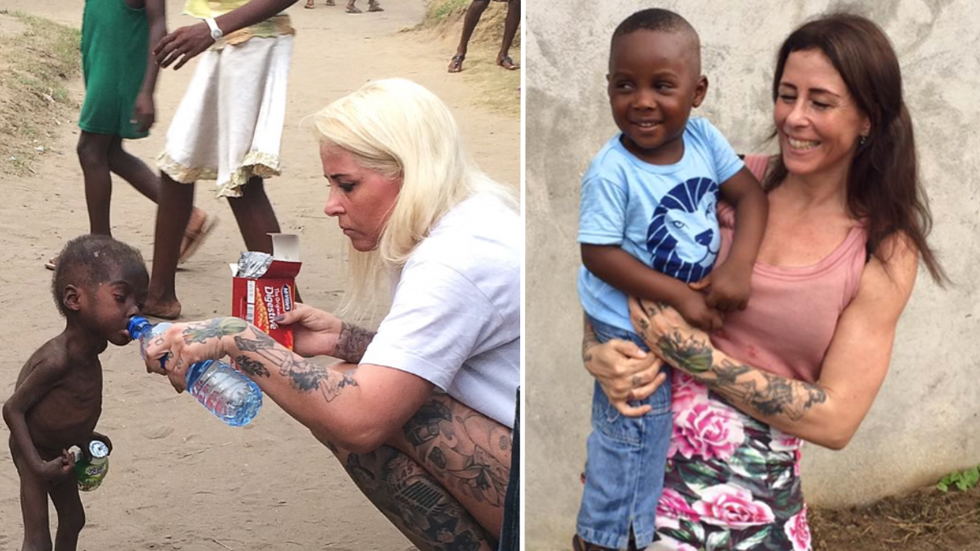Anja Lovén was 30 years old when she saw a British documentary about a child witch. She sat there in shock — and then in rage — as the television program detailed how these “witch children” are tortured, abandoned, even buried alive.
Many countries in Africa, and around the world, have a long history of the practice of witchcraft.
Historically, the elderly, the disabled, and anyone considered “different” were the main targets of accusations. But in the last 40 years, despite the practice being illegal, more and more children have been accused of being witches. Especially vulnerable, children are often unable to defend themselves and suffer the most horrific abuse.
The Life of a “Child Witch”
Under the guise of “exorcism,” an accused child witch in Africa can be made to ingest dangerous substances, blinded, beaten, or even set on fire. Witch doctors, shamans and religious leaders will try to coerce parents into paying large amounts of money for these exorcisms.
Some parents can’t or won’t pay. Those unfortunate children carry the label of ‘witch’ with them for the rest of their lives — which is often quite short because they are most often abandoned.
Without family, friends, shelter or food, these children are doomed to wander around the outskirts of communities. They scavenge for food in dumps. The sad truth is that they almost always die of dehydration, starvation, disease and neglect.
The Boy Who Changed Her Life
The images of these deplorable practices were burned into Anja’s brain that day when she watched the documentary. She couldn’t stop thinking about the injustice and about the leaders who were turning a blind eye to it.
A few years later, she decided that she couldn’t just continue her life, knowing what she did now. She quit her job, sold everything she had, and headed to Nigeria.
It was there that Anja came upon a tiny, naked, emaciated boy — a “child witch” — who stole her heart. As she knelt down next to him to gather him in her arms, someone took a picture. It went viral.
But that day, Anja’s mind was on one thing only: get help for this boy. She gave him water and drove him to the nearest hospital. Later, she would admit that she didn’t have much hope that he would survive. He was literally on the brink of death, wandering around a small village, starving and alone. Anja was told that he had been abandoned by his parents eight full months ago. It was clear that he didn’t have much time left.
He Has a Name
Just before Anja handed the boy over to doctors, she decided to give him a name: Hope. “I was so sure he would not survive,” she remembers. “Every breath he took was a struggle, and I did not want him to die without a name, without dignity, so I named him Hope.”
At the hospital, the frail child was treated for parasites and given blood transfusions. The situation looked bleak. Anja took to the internet to voice her outrage — and support poured in from all over the world.
In no time at all, over a million dollars had been raised. It was enough to not only cover the boy’s medical expenses but also to start a nonprofit organization to rescue so-called child witches.
Land of Hope
Today, Anja is on a mission. Her nonprofit organization, called Land of Hope, raises awareness for the plight of the “child witches” and provides the accused with care, stability and love at the orphanage Anja opened with her Nigerian husband, humanitarian lawyer and worker David Umem.
Two months after Anja rescued him from his life-threatening ordeal, Hope made a full recovery. He now runs around with a while pack of children at the orphanage. He has also since met his biological mother and father. Hope’s mother was only 15 years old when she gave birth to the boy, given in marriage to a village leader more than four times older than her. When her son was accused of being a child witch, she left him behind. Hope and his parents are taking steps to mend their relationship, but Hope still calls Anja his mom.
Anja and David treat all the children at Land of Hope like their own, but they also have a biological son, David Jr., who grew up at the heart of his parents’ mission.
“I want him to know the most important thing you can do in life is to help other people in need and be a good person,” says Anja of her son. “To listen, be empathic, and not judge other people. I hope he will remember his mother as someone who helped other people.”
Indeed, on Land of Hope’s website, “hope” is an acronym: Help One Person Everyday. It’s a simple mantra with the potential for big impact that everyone in the world can implement right now.
More from Goalcast:
